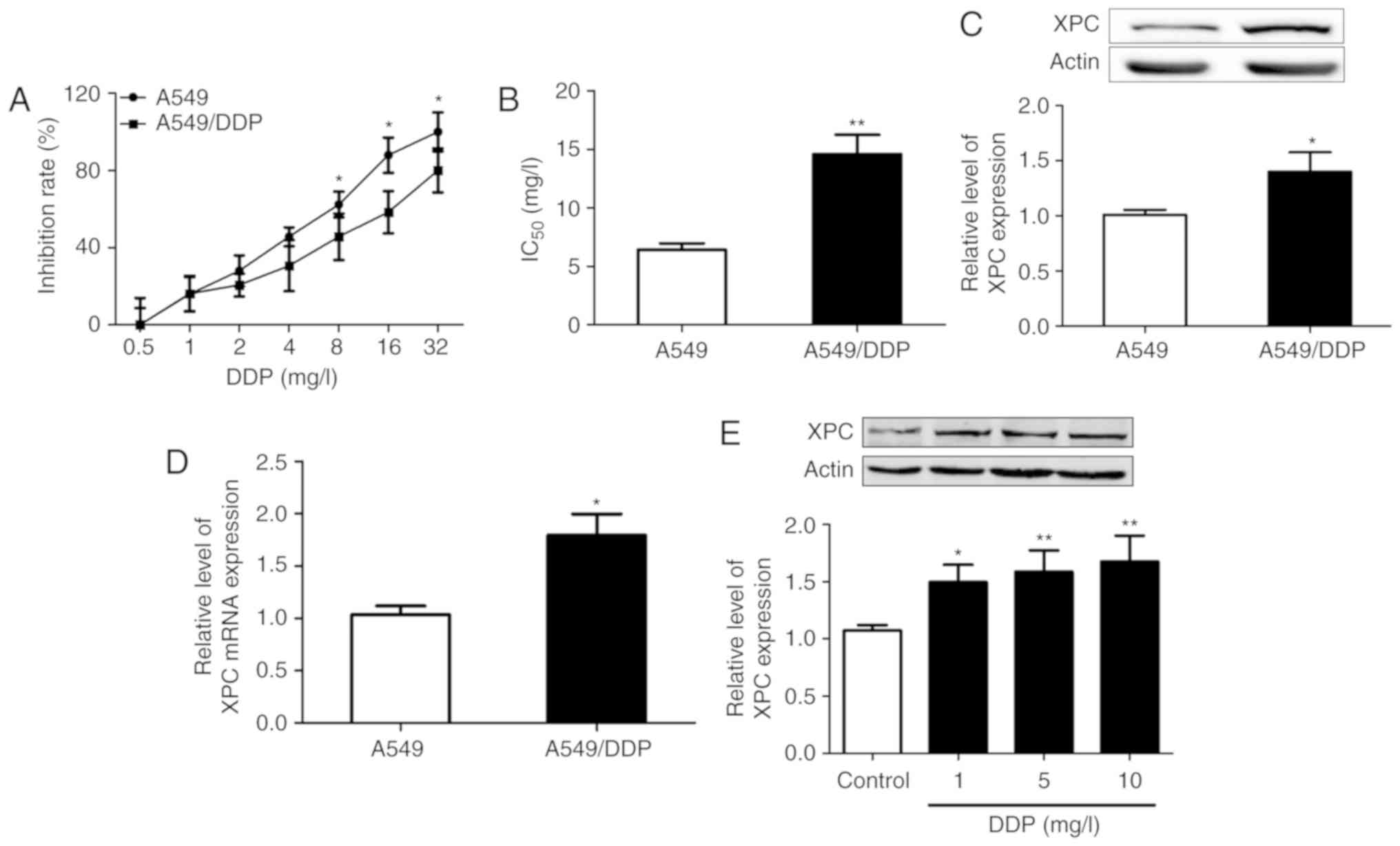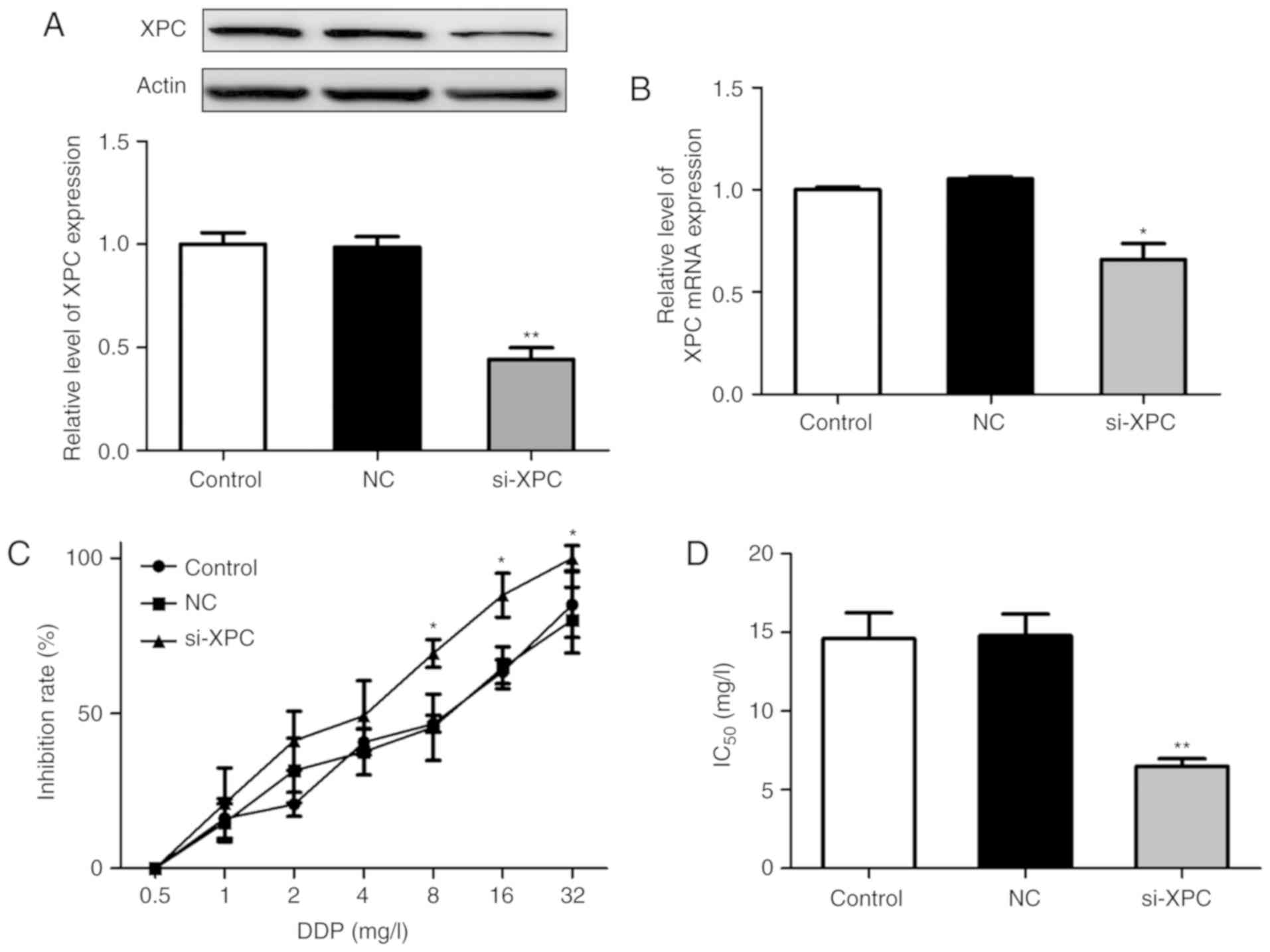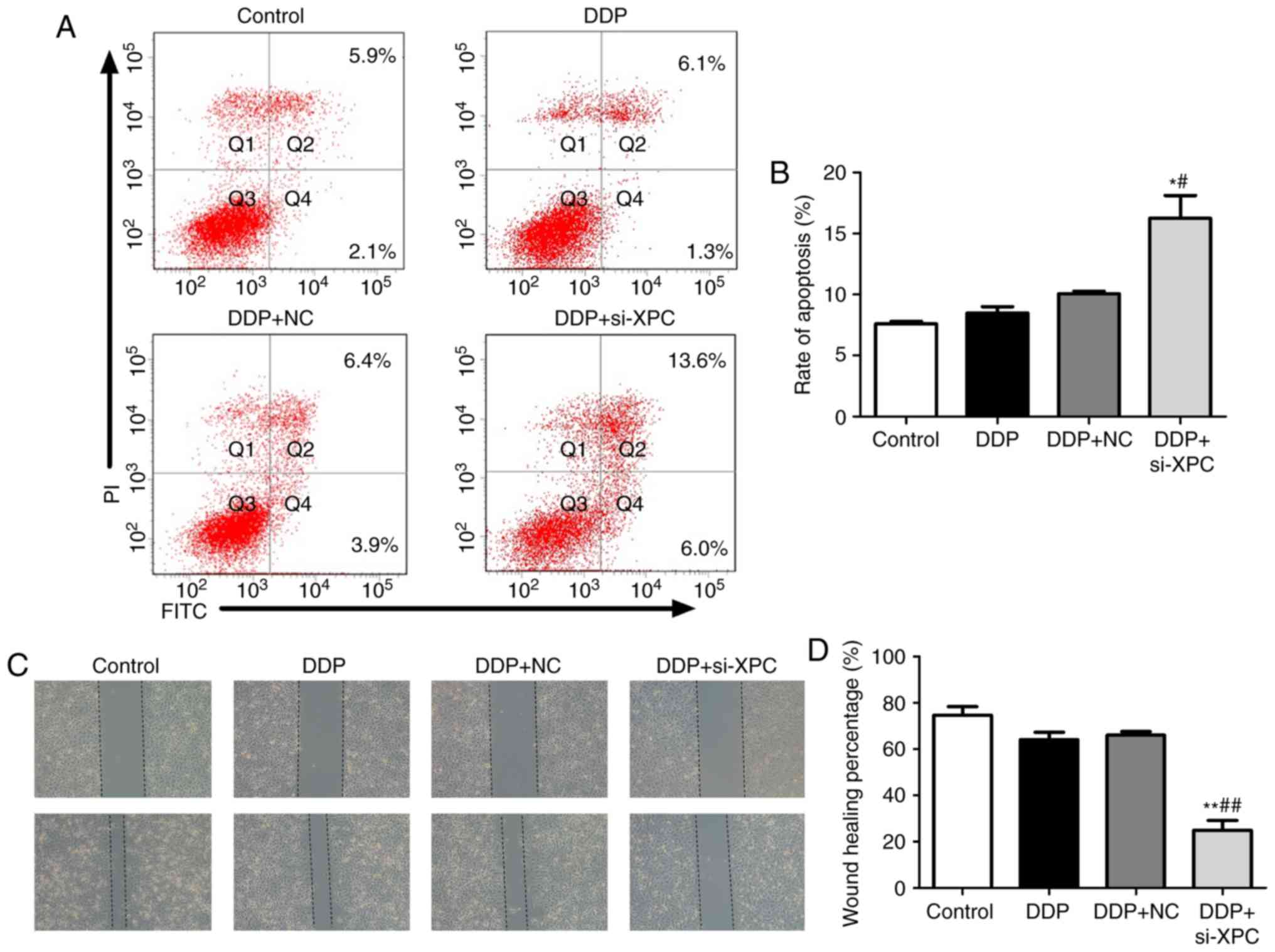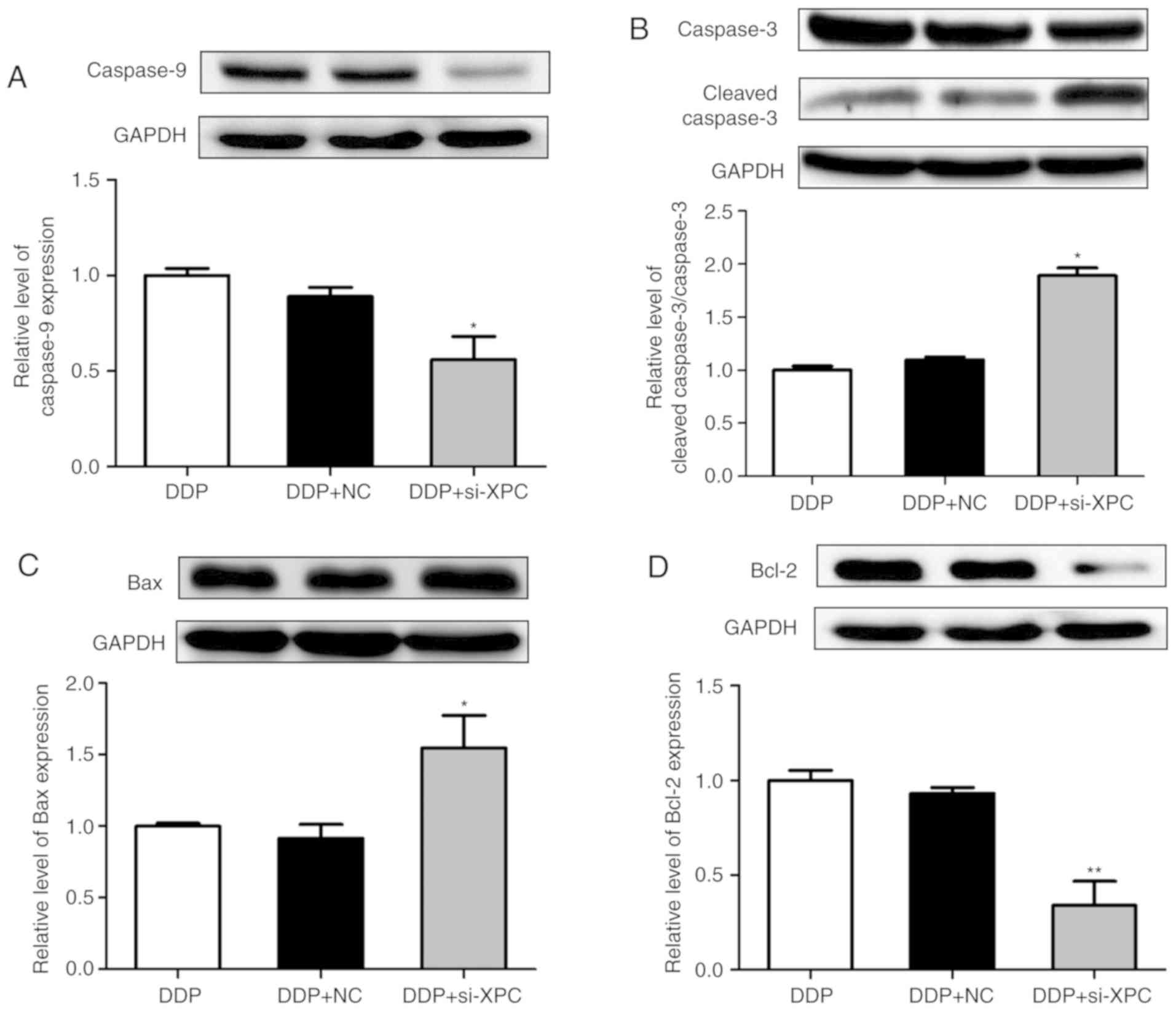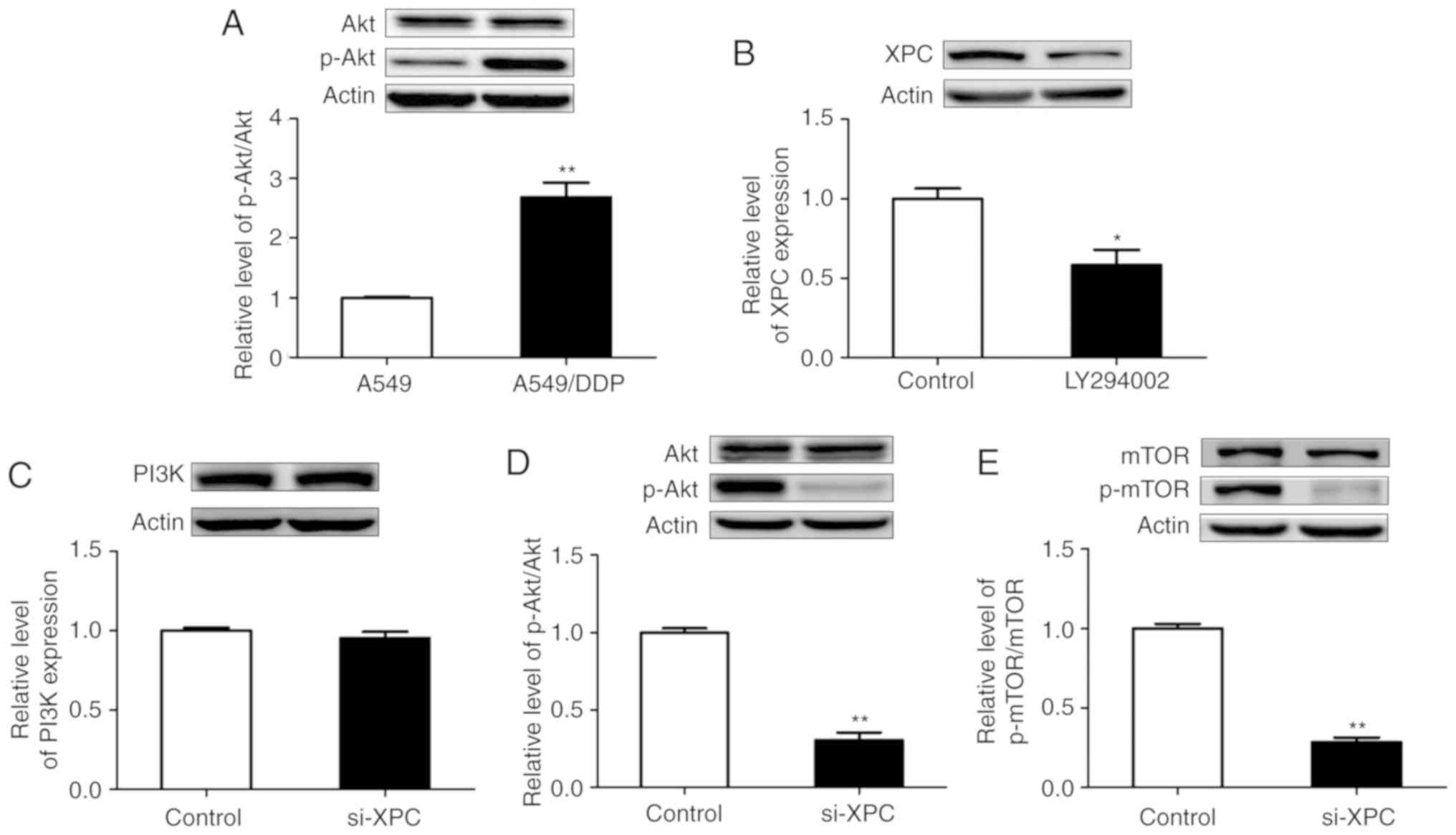|
1
|
Siegel RL, Miller KD and Jemal A: Cancer
statistics, 2015. CA Cancer J Clin. 65:5–29. 2015. View Article : Google Scholar : PubMed/NCBI
|
|
2
|
NSCLC Meta-Analyses Collaborative Group:
Chemotherapy in addition to supportive care improves survival in
advanced non-small-cell lung cancer: A systematic review and
meta-analysis of individual patient data from 16 randomized
controlled trials. J Clin Oncol. 26:4617–4625. 2008. View Article : Google Scholar : PubMed/NCBI
|
|
3
|
Siddik ZH: Cisplatin: Mode of cytotoxic
action and molecular basis of resistance. Oncogene. 22:7265–7279.
2003. View Article : Google Scholar : PubMed/NCBI
|
|
4
|
Amable L: Cisplatin resistance and
opportunities for precision medicine. Pharmacol Res. 106:27–36.
2016. View Article : Google Scholar : PubMed/NCBI
|
|
5
|
Milane L, Ganesh S, Shah S, Duan ZF and
Amiji M: Multi-modal strategies for overcoming tumor drug
resistance: Hypoxia, the Warburg effect, stem cells, and
multifunctional nanotechnology. J Control Release. 155:237–247.
2011. View Article : Google Scholar : PubMed/NCBI
|
|
6
|
De Silva IU, McHugh PJ, Clingen PH and
Hartley JA: Defining the roles of nucleotide excision repair and
recombination in the repair of DNA interstrand cross-links in
mammalian cells. Mol Cell Biol. 20:7980–7990. 2000. View Article : Google Scholar : PubMed/NCBI
|
|
7
|
Shell SM, Hawkins EK, Tsai MS, Hlaing AS,
Rizzo CJ and Chazin WJ: Xeroderma pigmentosum complementation group
C protein (XPC) serves as a general sensor of damaged DNA. DNA
Repair (Amst). 12:947–953. 2013. View Article : Google Scholar : PubMed/NCBI
|
|
8
|
Fautrel A, Andrieux L, Musso O, Boudjema
K, Guillouzo A and Langouët S: Overexpression of the two nucleotide
excision repair genes ERCC1 and XPC in human hepatocellular
carcinoma. J Hepatol. 43:288–293. 2005. View Article : Google Scholar : PubMed/NCBI
|
|
9
|
Yang LC, Hsiao YP, Lu CT, Huang CH, Chao
WR, Lin YT, Su HA, Chang SL and Chung JG: Xeroderma pigmentosum
complementation group C Protein (XPC) expression in basal cell
carcinoma. In Vivo. 29:35–38. 2015.PubMed/NCBI
|
|
10
|
Zhang Y, Yu JJ, Tian Y, Li ZZ, Zhang CY,
Zhang SF, Cao LQ, Zhang Y, Qian CY, Zhang W, et al: eIF3a improve
cisplatin sensitivity in ovarian cancer by regulating XPC and
p27Kip1 translation. Oncotarget. 6:25441–25451.
2015.PubMed/NCBI
|
|
11
|
Zhang Y, Cao J, Meng Y, Qu C, Shen F and
Xu L: Overexpression of xeroderma pigmentosum group C decreases the
chemotherapeutic sensitivity of colorectal carcinoma cells to
cisplatin. Oncol Lett. 15:6336–6344. 2018.PubMed/NCBI
|
|
12
|
Wang C, Nie H and Li Y, Liu G, Wang X,
Xing S, Zhang L, Chen X, Chen Y and Li Y: The study of the relation
of DNA repair pathway genes SNPs and the sensitivity to
radiotherapy and chemotherapy of NSCLC. Sci Rep. 6:265262016.
View Article : Google Scholar : PubMed/NCBI
|
|
13
|
Hollander MC, Philburn RT, Patterson AD,
Velasco-Miguel S, Friedberg EC, Linnoila RI and Fornace AJ Jr:
Deletion of XPC leads to lung tumors in mice and is associated with
early events in human lung carcinogenesis. Proc Natl Acad Sci USA.
102:13200–13205. 2005. View Article : Google Scholar : PubMed/NCBI
|
|
14
|
Wu YH, Wu TC, Liao JW, Yeh KT, Chen CY and
Lee H: p53 dysfunction by xeroderma pigmentosum group C defects
enhance lung adenocarcinoma metastasis via increased MMP1
expression. Cancer Res. 70:10422–10432. 2010. View Article : Google Scholar : PubMed/NCBI
|
|
15
|
Livak KJ and Schmittgen TD: Analysis of
relative gene expression data using real-time quantitative PCR and
the 2(-Delta Delta C(T)) method. Methods. 25:402–408. 2001.
View Article : Google Scholar : PubMed/NCBI
|
|
16
|
Jordheim LP, Crosperrial E, Matera EL,
Bouledrak K and Dumontet C: Expression of domains for
protein-protein interaction of nucleotide excision repair proteins
modifies cancer cell sensitivity to platinum derivatives and
genomic stability. Clin Exp Pharmacol Physiol. 41:817–824. 2014.
View Article : Google Scholar : PubMed/NCBI
|
|
17
|
Du P, Zhang X, Liu H and Chen L:
Lentivirus-mediated RNAi silencing targeting ERCC1 reverses
cisplatin resistance in cisplatin-resistant ovarian carcinoma cell
line. DNA Cell Biol. 34:497–502. 2015. View Article : Google Scholar : PubMed/NCBI
|
|
18
|
Wang Z, Liang X, Cheng Z, Xu Y, Yin P, Zhu
H, Li Q, Qian X and Liu J: Induction of apoptosis and suppression
of ERCC1 expression by the potent amonafide analogue 8-c in human
colorectal carcinoma cells. Anticancer Drugs. 24:355–365. 2013.
View Article : Google Scholar : PubMed/NCBI
|
|
19
|
Wang W, Zhang L, Liu L, Zheng Y, Zhang Y,
Yang S, Shi R and Wang S: Chemosensitizing effect of shRNA-mediated
ERCC1 silencing on a Xuanwei lung adenocarcinoma cell line and its
clinical significance. Oncol Rep. 37:1989–1997. 2017. View Article : Google Scholar : PubMed/NCBI
|
|
20
|
Despras E, Pfeiffer P, Salles B, Calsou P,
Kuhfittig-Kulle S, Angulo JF and Biard DS: Long-term XPC silencing
reduces DNA double-strand break repair. Cancer Res. 67:2526–2534.
2007. View Article : Google Scholar : PubMed/NCBI
|
|
21
|
Lai TC, Chow KC, Fang HY, Cho HC, Chen CY,
Lin TY, Chiang IP and Ho SP: Expression of xeroderma pigmentosum
complementation group C protein predicts cisplatin resistance in
lung adenocarcinoma patients. Oncol Rep. 25:1243–1251.
2011.PubMed/NCBI
|
|
22
|
Zhang K, Wang X and Wang H: Effect and
mechanism of Src tyrosine kinase inhibitor sunitinib on the
drug-resistance reversal of human A549/DDP cisplatin-resistant lung
cancer cell line. Mol Med Rep. 10:2065–2072. 2014. View Article : Google Scholar : PubMed/NCBI
|
|
23
|
Zhou D, Liu W, Liang S, Sun B, Liu A, Cui
Z, Han X and Yuan L: Apoptin-derived peptide reverses cisplatin
resistance in gastric cancer through the PI3K-AKT signaling
pathway. Cancer Med. 7:1369–1383. 2018. View Article : Google Scholar : PubMed/NCBI
|
|
24
|
Rezvani HR, Kim AL, Rossignol R, Ali N,
Daly M, Mahfouf W, Bellance N, Taïeb A, de Verneuil H, Mazurier F
and Bickers DR: XPC silencing in normal human keratinocytes
triggers metabolic alterations that drive the formation of squamous
cell carcinomas. J Clin Invest. 121:195–211. 2011. View Article : Google Scholar : PubMed/NCBI
|
|
25
|
Jiang W, Cheng Y, Zhao N, Li L, Shi Y,
Zong A and Wang F: Sulfated polysaccharide of Sepiella
Maindroni ink inhibits the migration, invasion and matrix
metalloproteinase-2 expression through suppressing EGFR-mediated
p38/MAPK and PI3K/Akt/mTOR signaling pathways in SKOV-3 cells. Int
J Biol Macromol. 107:349–362. 2018. View Article : Google Scholar : PubMed/NCBI
|
|
26
|
Zhao M, Xu P, Liu Z, Zhen Y, Chen Y, Liu
Y, Fu Q, Deng X, Liang Z, Li Y, et al: Dual roles of miR-374a by
modulated c-Jun respectively targets CCND1-inducing PI3K/AKT signal
and PTEN-suppressing Wnt/β-catenin signaling in non-small-cell lung
cancer. Cell Death Dis. 9:782018. View Article : Google Scholar : PubMed/NCBI
|
|
27
|
Cheng H, Zou Y, Ross JS, Wang K, Liu X,
Halmos B, Ali SM, Liu H, Verma A, Montagna C, et al: RICTOR
amplification defines a novel subset of lung cancer patients who
may benefit from treatment with mTOR1/2 inhibitors. Cancer Discov.
5:1262–1270. 2015. View Article : Google Scholar : PubMed/NCBI
|















